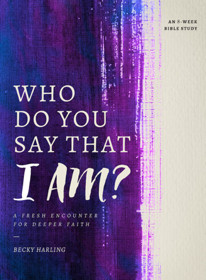How to SHUT UP the Accuser + Book Giveaway (3 winners!)
[Editor’s Note: This is an excerpt from Becky Harling’s book Who Do You Say That I Am? Moody Publishers gave me THREE (!) copies of the book to giveaway to Devotional Diva readers! Here’s just a taste of the book — sign up for the giveaway below!]
HOW TO SHUT UP THE ACCUSER
Adapted from Who Do You Say That I AM? by Becky Harling (©2018).
Published by Moody Publishers. Used by permission.
I felt upset, confused, and angry. I was in California getting ready to speak at a women’s conference but had just received an extremely critical email. The person writing the email had lashed out with many accusations over the fact that I was sharing my story. My head was spinning. I felt Satan hurling every insult and accusation at me as I closed my computer. His messages went something like this, “You’re emotionally unstable! You shouldn’t be out there speaking and at the very least not telling your story. You’re unfit to speak.”
I cried, “Lord, how can I speak tomorrow? I’ve got nothing!”
Instantly, the Holy Spirit reminded me of how to shut up Satan. I turned on some praise music and grabbed my Bible. Thankfully, no one was home in the house where I was staying. I began praising God and quoting Scripture.
If anyone had been looking through the window, they would have thought I was nuts! There I was, with praise music blaring, marching around the house with my Bible in hand praising my way through the alphabet at the top of my lungs. . .
“Lord, I praise you because you have all authority, and Satan can’t thwart your plans! I praise you because you’re the Blessed Controller of all things. I praise you because you promise to deliver me from evil,
I continued until I literally felt a breakthrough. I finally relaxed, praised God that He would speak the next day, and took some time to rest.
Here’s what I know: Even though a person has received Christ as her Messiah and asked for forgiveness of sins, Satan will try to attack with feelings of guilt and shame.
Today, we’re going to take a look at shame and false guilt. And I’m going to teach you how to tell the enemy loud and clear to “Shut up!” Are you ready? You must learn this skill to help protect yourself from the taunts and torments of Satan.
EXPLORE
Read Revelation 12:10–11. What is Satan called in these verses?
As the accuser, Satan lives his life around one single purpose: accusing you. Sad, huh? But he loves nothing more than to get you twisted into fits of self-doubt and shame so that he renders you useless at proclaiming what God has done in your life. How does he do this? He has several strategies, and here are just a few:
Guilt over sin you’ve already confessed. I’ve seen this strategy employed time after time as I’ve spoken at women’s conferences, particularly in the realm of sexuality and abortion. Friend, may I
speak directly to you? No matter what you’ve done, no matter how horrible the act, if you’ve confessed your sin, Christ has forgiven you. God no longer dwells on your sin, so neither should you!
When Satan hurls accusations at you, you must stand tall and slap him with Scripture! You might say,
“Satan, shut up! In the name and power of Jesus Christ, you have no place here. I’m under the authority of Jesus Christ. My sin has been covered by the blood of the Lamb. I’ve confessed my sin, and Jesus has been faithful and just to forgive my sin and to cleanse me completely (1 John 1:9). I am chosen, holy, and dearly loved” (Col. 3:12).
Read Psalm 103:12. What does this verse teach us about God removing our sin from us?
Guilt over unmet or unrealistic expectations. No matter how hard you try, you will not keep everyone happy. Some people will have expectations of you that you simply cannot live up to. When you disappoint them, they manipulate you, and you end up feeling guilty. Here are a few examples:
Your schedule is very busy right now. Time is at a premium, and you’re trying to prioritize your husband and children. A friend feels hurt because you haven’t spent enough time with her. You feel guilty because you’re afraid you’re not being a good friend.
Your definition of being a “good mother” means always baking homemade cookies like your neighbor, but you hate baking, and every time you try, you burn the cookies. When you see what’s packed in your neighbor’s kids’ lunch boxes, you feel guilty.
Your mother feels you need to prioritize spending time with her over the Bible study you’re attending at your church. She brings it up every week informing you that she’s getting old, and if you were a “good Christian,” you would spend time with her instead. You hang up the phone as feelings of guilt wash over you.
What you’ll notice about each of those examples is that none of them contradict a biblical principle. False guilt has nothing to do with truth or what the Word of God says is sin. False guilt often challenges our personal boundaries. But it’s godly to set boundaries.
Read Mark 1:35–39. What does this story about Jesus teach you about setting boundaries?
Guilt over evil done to you. As a child, I was sexually abused. Evil was done to me. As an adult, I struggled with a pervasive sense of being unclean. What I was struggling with was a profound sense of shame. I felt guilty and embarrassed about what had been done to me. As a result of the shame I felt, I took on guilt that was not my own. It wasn’t until I worked with a counselor and pursued Christ as my Healer that God set me free from shame.
Read Ezekiel 18:20.
What does this verse teach you about taking responsibility for another person’s sin?
How does this verse release you from shame about evil committed against you?
When you feel guilty, ask yourself the following questions:
- Have I disobeyed God in some area of my life?
- Is Satan bringing up my past and something that I’ve already confessed?
- Am I feeling guilty because I don’t measure up to someone’s expectations for me?
- Am I feeling guilty because of evil done against me?
If your answer is yes to the first question, become a fast confessor. Turn from your sin, and get on board with God’s desires for you. If it’s any of the other three, remind yourself that you are holy and blameless.
REFLECT
The two best weapons I know for fighting Satan when he tries to throw guilt and shame at you are: Praise and Scripture.
Read Psalm 149:6. Write this verse down.
CREATE AN EMERGENCY FAITH KIT
Many homes have an emergency kit for when family members get hurt or need first aid. Similarly, in our spiritual walks, we need an emergency kit of Scripture verses and praise songs that we can go to instinctively when Satan is attacking or we’re facing a crisis.
On a notecard, write out five verses of your choice that you will keep in your emergency kit, and write down the name of five praise songs that you will either sing or play when Satan starts with his “blah, blah, blah.” I will get you started with the first Scripture verse, and the rest you can choose on your own.
Scripture Verses
-
Philippians 2:9–11. “Therefore God exalted him to the highest place and gave him the name that is above every name, that at the name of Jesus every knee should bow, in heaven and on earth and under the earth, and every tongue acknowledge that Jesus is Lord, to the glory of God the Father.”
 BECKY HARLING holds a degree in Biblical Literature and is a sought-after speaker and Bible teacher at women’s conferences. Becky is a gifted communicator with a passion for helping women find life transformation through Jesus. She is the author of several books including Who Do You Say That I AM?, How to Listen So People Will Talk, Rewriting Your Emotional Script and The 30 Day Praise Challenge. She is host of the podcast Beyond Beautiful and can be reached at beckyharling.com. Becky and her husband, Steve, minister throughout the world in his role as president of the global ministry, Reach Beyond. They make their home in Colorado and have four grown children and eleven grandchildren.
BECKY HARLING holds a degree in Biblical Literature and is a sought-after speaker and Bible teacher at women’s conferences. Becky is a gifted communicator with a passion for helping women find life transformation through Jesus. She is the author of several books including Who Do You Say That I AM?, How to Listen So People Will Talk, Rewriting Your Emotional Script and The 30 Day Praise Challenge. She is host of the podcast Beyond Beautiful and can be reached at beckyharling.com. Becky and her husband, Steve, minister throughout the world in his role as president of the global ministry, Reach Beyond. They make their home in Colorado and have four grown children and eleven grandchildren.
GIVEAWAY TIME:
This is a Rafflecopter giveaway. Please sign up below and contact me if you have any issues. Since the publisher will be mailing out the THREE copies of Who Do You Say That I Am?, this giveaway is US-only. This giveaway will end in one week on March 13th. I will contact winners then for their addresses.
Thanks for reading! Blog comments are closed. You can follow Devotional Diva on Facebook here, on Instagram here @devotional_diva, on Twitter here @devotionaldiva and email me, Maggie, at editor(at)devotionaldiva(dot)com anytime.







